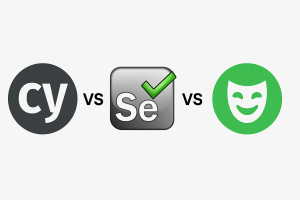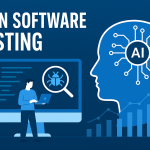How to Choose b/w Selenium Vs Cypress Vs Playwright
In the era of AI and ML, many companies still face challenges in selecting the right web automation tool. Often, teams are unsure about the key factors to consider when making this decision. So, what are the best criteria for choosing an automation framework?
In this blog, we’ll explore the essential factors for selecting a web automation tool that aligns with your project or organizational needs. We’ll also compare three of the most popular tools today—Selenium (WebDriver), Cypress, and Playwright—based on these criteria to help you make an informed choice.

Let’s begin with the first question, what should be the pointer to consider before choosing a Web Automation Tool:
- Community Support
- Pricing of the tool
- Language Support
- FE Application Tech Stack Dependencies
- Browser Supports
- Integration Capabilities for CI/CD Pipeline
- Reporting and Test Data Management
- Scalability of the framework
- Ease of Use & Less Maintenance (Modular Approach/Loose couple)
- Future Tech Support
Let’s not make the blog to lengthy, direct jump to comparison of famous 3 tool on the above mentioned pointer.
Community Support
- Playwright: Backed by IT giant Microsoft. Microsoft supports the expanding community, which is becoming more well-liked in contemporary online testing.
- Selenium: Richest and most established community with a wealth of forum help and documentation.
- Cypress: JavaScript developers make up the majority of this medium-sized group, but enterprise-level support is lacking.
Pricing of the Tool
- Playwright: Free for all users and completely open-source.
- Selenium: Open-source and totally free; there are no premium versions.
- Cypress: There is a free open-source version, but Cypress Cloud, which costs money, has more functionality.
Language Support
- Playwright: Supports Typescript(Recommended), JavaScript, TypeScript, Python, Java & C#.
- Selenium: Supports Java(most popular), Python, C#, JavaScript, Ruby, and more.
- Cypress: Mostly TypeScript and JavaScript, with no official support for other languages.
Frontend Application Dependencies
- Playwright: Compatible with all frontend frameworks, including React (Most popu;ar for web development in today’s world), Angular & Vue.
- Selenium: All web technologies are supported, and there are no frontend stack dependencies.
- Cypress: Designed primarily for JavaScript apps, React, Angular, and Vue work well with it.
Browser Support
- Playwright: Supports Chrome, Edge, Firefox, and WebKit (including mobile simulation).
- Selenium: Broadest compatibility, encompassing Internet Explorer, Chrome, Edge, Firefox, Safari, and Opera.
- Cypress: Supports Chrome, Photon(Inbuilt of Cypress), and Firefox, but lacks Safari support.
CI/CD Integration
- Playwright: Seamless integration with Git based tools (GitHub Actions, GitLab, etc), Jenkins, Cloud based (Azure DevOps, AWS CICDPipeline).
- Selenium: Widely used in enterprise pipelines, it is compatible with all CI/CD technologies.
- Cypress: Good CI/CD tool integration, although Cypress Cloud (paid) is needed for parallel execution.
Reporting and Test Data Management
- Playwright: Test retries, video capture, and tracing are all integrated debugging capabilities.
- Selenium: Follows modular approach and provide free hands to use any third-party tools like ExtentReports, Allure Report.io, etc for advanced reporting. You can develop your own reporting mechanism too.
- Cypress: Sas a time-travel debugging interactive test runner; Cypress Cloud(Paid) improves reporting.
Scalability of the Framework
- Playwright: With integrated parallel execution and multi-browser testing, it is extremely scalable.
- Selenium: Supports large-scale testing via Selenium Grid(Open-source) and cloud (paid) providers like LamdaTest, BrowserStack., HeadSpin, SauceLab etc
- Cypress: Restricted scalability; only the premium Cypress Cloud offers parallel execution.
Ease of Use & Maintenance
- Playwright: Flakiness is decreased by a straightforward API, automated waits, and improved synchronisation.
- Selenium: Increases the flakiness of tests by requiring explicit waiting and additional upkeep.
- Cypress: JavaScript developers find it easy to set up, but async operations are difficult.
Future Tech Support
- Playwright: Microsoft is actively developing it and swiftly implementing contemporary web technology..
- Selenium: Dependable and well-known, but it takes longer to implement new features.
- Cypress: Restricted to the JavaScript ecosystem, and new browser versions are adopted more slowly.
The above pointers provide a high-level overview to help you choose the right web automation tool for your needs.
In our next blog, we’ll explore various plugins and extensions compatible with these tools, enabling you to build a more robust and efficient testing framework.
Stay tuned, and happy coding! 🚀








